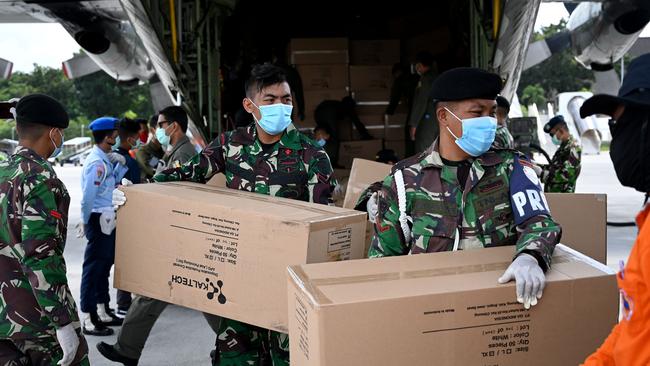Millions headed for the breadline in Indonesia
Indonesia is facing an economic slide that could reverse a decade of gains and force nine million more people into poverty this year.

Indonesia is facing an economic slide that could reverse a decade of gains and force close to nine million more people into poverty this year, researchers have warned as the government rushes to reopen for business despite record daily peaks in COVID-19 infections.
A draft timeline for the loosening of restrictions across the country, including Greater Jakarta which is still the epicentre of the outbreak, plans for a staged reopening starting with shopping malls operating on limited hours from June 8, followed by museums, and schools on staggered schedules in mid-June.
Restaurants, bars, cafes and gyms could reopen with tight protocols from July 6, followed by eased restrictions on travel and public worship, with a full reopening by the end of July.
Tri Yunis Miko Wahyono, a member of the National COVID-19 taskforce and head of epidemiology at the University of Indonesia, told The Weekend Australian it was “premature” to reopen the economy given there was no evidence social restrictions imposed in April had helped stem the spread of the disease.
“What is the basis to consider relaxing large scale social restrictions? Transmission numbers are high and rising. If the regulations are relaxed yes it will help the economy, but transmission will increase as well,” he said.
Indonesia has 16,496 cases though it also has 34,360 suspected patients under observation.
The Indonesian government has been widely criticised also over a ban it imposed last month on all air, sea, rail and road traffic in and out of Greater Jakarta, only to subsequently allow multiple exceptions. The farcical situation was highlighted this week by pictures of crowds packed into the foyer of Jakarta’s Soekarno Hatta airport seeking entry for flights out of the capital ahead of next week’s Eid holiday.
Like many developing nations, however, the government is caught between the need to protect its population from the virus and also protect its most vulnerable from hunger.
A study by the AusAid-funded Social Monitoring and Early Response Unit has predicted 8.5 million Indonesians could fall into poverty this year as a result of the pandemic, bringing the total number of poor to 33.24 million, or 12.37 per cent of Indonesia’s population _ a figure last seen in 2009.
“(That) means Indonesia’s progress in reducing poverty over the last decade would be wiped out,” the study found.
More than two million Indonesians have lost their jobs in the past two months, many of them informal workers who rely on daily wages to meet their basic needs and who make up more than 55 per cent of the country’s total workforce.
Raden Pardede, the architect of Indonesia’s reopening timetable, said the plan was contingent on flattening the curve of new cases. If that didn’t happen, restrictions would be extended into August.
But, he added: “The most important thing is to prevent hunger”.



To join the conversation, please log in. Don't have an account? Register
Join the conversation, you are commenting as Logout